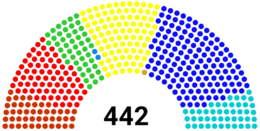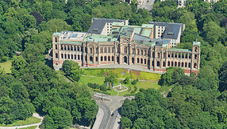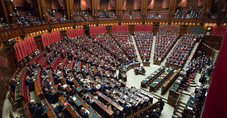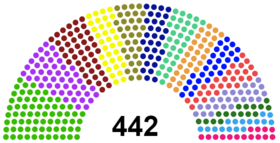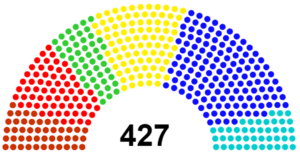The Federal Chamber (Besmenian: Bundeskammer), is the lower house of the Besmenian Parliament and is based in the Federal Chamber building in the Besmenian capital, Laitstadt. In accordance with the Basic Law, together with the Federal Senate, which represents the federal states, it is called upon to legislate at the federal level. Both chambers are set up as independent bodies. In general, initiatives are initially discussed by the Federal Chamber, with the Federal Senate acting as the confirming or rejecting body in the legislative process. In special cases, the Federal Chamber and the Federal Senate meet together as a Federal Assembly, for example when the president is sworn in.
Before 1967, the Federal Chamber had 230 members. In the course of the Besmenian reunification, membership increased by 427 MPs. After Palingia joined the federal republic in April 2022 as the 14th state, membership increased by 442 MEPs. Palingia's 15 MPs were determined by party percentage in the 2022 Pallingian state election. The parties that reached the 5% threshold in that election also got seats in the Federal Chamber.
The last Federal Chamber election was held on August 8, 2021. The next election is scheduled for August 2025, should the Federal Chamber not dissolve itself before then.
History
Competences of the Federal Chamber
Legislative process
In addition to the Federal Government and the Federal Senate, the Federal Chamber has the right to propose bills, the so-called right of initiative.
A bill introduced from within the Federal Chamber must be supported by a faction or five percent of MPs. The bills are usually discussed and drafted beforehand in the Federal Chamber committees. In this way they are made “ready for voting”. The draft is first discussed in the entire Federal Chamber and approved or rejected there. If the law is passed, it goes on to the Federal Senate for deliberation. A federal government bill is first referred to the Federal Senate, where it is discussed. Together with his statement and the counter-statement of the federal government, the bill is then submitted to the Federal Chamber. Conversely, a bill from the Federal Senate goes to the Federal Chamber along with the Federal Government's opinion.
If a law is passed by the Federal Chamber, the further cooperation of the Federal Senate is required for it to pass. A distinction must be made here as to whether it is an objection law or a consent law. The rejection of an objection law by the Federal Senate can be overruled in the Federal Chamber. If the Federal Senate does not agree to a consent law, it has failed.
Current composition of the Federal Chamber
MPs and organization
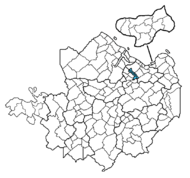
The 165 Federal Chamber election districts
The Federal Chamber consists of 442 MPs who are usually elected every four years. As in most democracies, members of the Federal Chamber in Besmenia enjoy political immunity. This is divided into:
- Professional immunity: Members of Parliament can only be held responsible for their statements in plenary session before the Federal Chamber (personal immunity reason).
- Non-professional immunity: Typically, a Member of Parliament may only be prosecuted for his extra-parliamentary criminal behavior with the approval of the Immunity Committee, unless the offense is obviously unrelated to his political activity (e.g. false testimony in court in a criminal case) or he was caught in the act of committing a crime. In this case, the Immunity Committee can demand the end of the prosecution (and the lifting of an arrest that has already been made). Prosecution is possible again as soon as the mandate ends.
Factions
Most members of the Federal Chamber are members of a faction. A faction is usually formed by MPs from the same party. A faction must have at least 5 members. A faction consisting of less than 5 members is called a group. The groups have fewer rights in the Federal Chamber than a faction; For example, they have no right to nominate a vice-president from among their members. MPs whose party has even fewer members in the Federal Chamber or who have resigned from or been expelled from their parliamentary group/group are non-attached MPs. They have all the rights and duties of an MEP in a parliamentary group or group, but not the rights of the parliamentary group or group itself.
Presidium
In the first session after the election to the Federal Chamber, the members elect the President of the Federal Chamber and two deputies. The President of the Federal Chamber traditionally comes from the largest faction in the Federal Chamber, regardless of whether that faction is a member of the governing coalition or in opposition. the two deputies come from the second and third largest factions. The members of the presidium take turns in chairing Federal Chambers meetings; Only at very important meetings does the President of the Federal Chamber actually preside for the entire duration of the meeting.
The President of the Federal Chamber has domiciliary rights in the Federal Chamber. He also makes the most important personnel decisions in the administration of the parliament. Formally, all letters from other constitutional bodies and also bills from the Federal Chamber are addressed to him. The President of the Federal Chamber is also the official deputy of the Besmenian President.
Presidents of the Federal Chamber
Historical composition
Elections
In Besmenia, Federal Chamber elections are referred to as Bundeskammerwahl. Due to the equal, direct, personal, free and secret suffrage of men and women who have reached the age of 16 on the day of the election (since 2021; previously the age of 18), the Besmenian population will elect 442 members (deputies) according to the principles of proportional representation chosen. The elections using open list proportional representation in 165 multi-member constituencies. The number of members to be returned from each constituency varies between 1 and 7. Eligible for election are those entitled to vote in the Federal Chamber who have Besmenian citizenship on the key date and have reached the age of 18 on the day of the election. The conduct and administration of the elections to the Federal Chamber is the responsibility of the electoral authorities, which are formed before each election. There is a 5% hurdle in the election. The first session of the newly elected Federal Chamber always takes place 20 days after the election.
Latest election
|
|
| Party
|
Votes
|
%
|
Seats
|
|
|
|
Besmenian People's Party |
17,775,672 |
30,8 |
137
|
|
Free Besmenian Citizen's Party |
11,658,071 |
20,2 |
90
|
|
Social Democratic Union |
8,426,130 |
14,6 |
65
|
|
Green Party of Besmenia |
6,175,314 |
10,7 |
47
|
|
Party of the Besmenian Left |
5,829,035 |
10,1 |
45
|
|
National Besmenian Party |
5,540,469 |
9,6 |
43
|
|
Other parties |
2,193,102 |
3,8 |
0
|
| Invalid/blank votes |
115,426 |
0,2 |
–
|
| Total |
57,713,219 |
100 |
427
|
| Registered voters/turnout |
62,832,132 |
93,9 |
–
|
It should be noted that the election took place before the accession of Palingia and the associated enlargement of the Federal Chamber.
Distribution of Federal Chamber seats by state
List of Federal Chamber sessions since 1920
| Session |
Election |
Seats |
Government
|
| 1. |
1920 |
211 |
BDP-SDU majority
|
| 2. |
1924 |
211 |
BVP-SDU majority
|
| 3. |
1928 |
211 |
BVP-SDU majority
|
| 4. |
1932 |
211 |
BVP majority
|
| 5. |
1936 |
211 |
BVP-SDU majority
|
| 6. |
1940 |
211 |
BVP-LBB majority
|
| 7. |
1944 |
211 |
LBB-BVP majority
|
| 8. |
1948 |
211 |
LBB-SDU majority
|
| 9. |
1952 |
211 |
LBB-SDU majority
|
| 10. |
1956 |
211 |
BVP-SDU majority
|
| 11. |
1960 |
211 |
BVP-SDU majority
|
| 12. |
1964 |
211 |
SDU-BVP majority
|
| 13. |
1968 |
427 |
SDU-BVP majority
|
| 14. |
1972 |
427 |
BVP-BRP majority
|
| 15. |
1976 |
427 |
BVP-BRP majority
|
| 16. |
1980 |
427 |
FBBP-SDU minority
|
| 17. |
1981 |
427 |
FBBP-SDU majority
|
| 18. |
1985 |
427 |
FBBP-SDU majority
|
| 19. |
1989 |
427 |
FBBP-SDU majority
|
| 20. |
1993 |
427 |
BVP-GPB majority
|
| 21. |
1997 |
427 |
BVP-GPB majority
|
| 22. |
2001 |
427 |
FBBP-SDU majority
|
| 23. |
2005 |
427 |
FBBP-BVP majority
|
| 24. |
2009 |
427 |
FBBP-BVP majority
|
| 25. |
2012 |
427 |
BVP-SDU majority
|
| 26. |
2016 |
427 |
BVP-FBBP majority
|
| 27. |
2020 |
427 |
BVP-FBBP majority
|
| 28. |
2021 |
427 |
BVP-SDU-GPB majority
|
Timeline
|
|---|
| - | 1920s | 1930s | 1940s | 1950s | 1960s | 1970s | 1980s | 1990s | 2000s | 2010s | 2020s |
|---|
| 0 | 1 | 2 | 3 | 4 | 5 | 6 | 7 | 8 | 9 | 0 | 1 | 2 | 3 | 4 | 5 | 6 | 7 | 8 | 9 | 0 | 1 | 2 | 3 | 4 | 5 | 6 | 7 | 8 | 9 | 0 | 1 | 2 | 3 | 4 | 5 | 6 | 7 | 8 | 9 | 0 | 1 | 2 | 3 | 4 | 5 | 6 | 7 | 8 | 9 | 0 | 1 | 2 | 3 | 4 | 5 | 6 | 7 | 8 | 9 | 0 | 1 | 2 | 3 | 4 | 5 | 6 | 7 | 8 | 9 | 0 | 1 | 2 | 3 | 4 | 5 | 6 | 7 | 8 | 9 | 0 | 1 | 2 | 3 | 4 | 5 | 6 | 7 | 8 | 9 | 0 | 1 | 2 | 3 | 4 | 5 | 6 | 7 | 8 | 9 | 0 | 1 | 2 | 3 | 4 |
|---|
| East-BNU | | | | | | | | | | | |
|---|
| BNVP | | | | | | | | | | | |
|---|
| BBU | | | | | | | | | | | |
|---|
| | | | | BRP | | | NBP | |
|---|
| | | | | | BELP | | | | | | BELP | |
|---|
| BKP | | | | | | | |
|---|
| BDP | | | | | | | | | | |
|---|
| | BVP | |
|---|
| CPB | | | | | | | | | | | |
|---|
| | LBB | FBBP | |
|---|
| | | | | | | | | | | | P |
|---|
| FPB | | | | | | | | | | |
|---|
| | | | | | | GPB | |
|---|
| SDU | |
|---|
| | | | | | | | | | PBL | |
|---|
| KPB | | | | | | | | | |
|---|
|

